
Cambridge is a city in Middlesex County, Massachusetts, and part of the Boston metropolitan area. At the 2020 U.S. Census, the city's population was 118,403, making it the fourth most populous city in the state, behind Boston, Worcester, and Springfield. It is one of two de jure county seats of Middlesex County, although the county's executive government was abolished in 1997. Situated directly north of Boston, across the Charles River, it was named in honor of the University of Cambridge in England, once also an important center of the Puritan theology embraced by the town's founders.
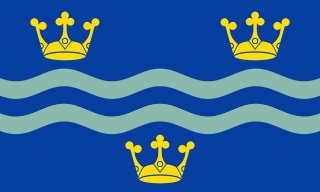
Cambridgeshire is a county in the East of England, bordering Lincolnshire to the north, Norfolk to the north-east, Suffolk to the east, Essex and Hertfordshire to the south, and Bedfordshire and Northamptonshire to the west. The city of Cambridge is the county town. Following the Local Government Act 1972 restructuring, modern Cambridgeshire was formed in 1974 through the amalgamation of two administrative counties: Cambridgeshire and Isle of Ely, comprising the historic county of Cambridgeshire ; and Huntingdon and Peterborough, comprising the historic county of Huntingdonshire and the Soke of Peterborough, historically part of Northamptonshire. Cambridgeshire contains most of the region known as Silicon Fen.
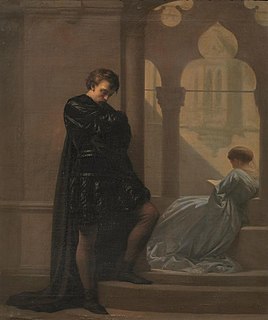
The Tragedy of Hamlet, Prince of Denmark, often shortened to Hamlet, is a tragedy written by William Shakespeare sometime between 1599 and 1601. It is Shakespeare's longest play, with 29,551 words. Set in Denmark, the play depicts Prince Hamlet and his revenge against his uncle, Claudius, who has murdered Hamlet's father in order to seize his throne and marry Hamlet's mother.

Sir Isaac Newton was an English mathematician, physicist, astronomer, alchemist, theologian, and author, widely recognised as one of the greatest mathematicians and physicists and among the most influential scientists of all time. He was a key figure in the philosophical revolution known as the Enlightenment. His book Philosophiæ Naturalis Principia Mathematica, first published in 1687, established classical mechanics. Newton also made seminal contributions to optics, and shares credit with German mathematician Gottfried Wilhelm Leibniz for developing infinitesimal calculus.
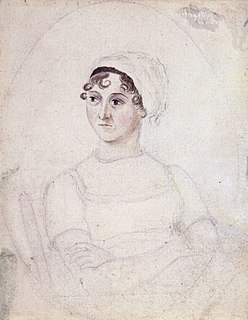
Jane Austen was an English novelist known primarily for her six major novels, which interpret, critique, and comment upon the British landed gentry at the end of the 18th century. Austen's plots often explore the dependence of women on marriage in the pursuit of favourable social standing and economic security. Her works critique the novels of sensibility of the second half of the 18th century and are part of the transition to 19th-century literary realism. Her use of biting irony, along with her realism and social commentary, have earned her acclaim among critics and scholars.
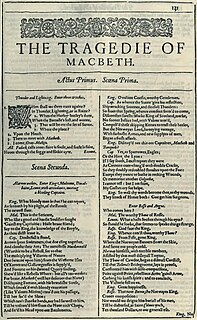
Macbeth is a tragedy by William Shakespeare. It is thought to have been first performed in 1606. It dramatises the damaging physical and psychological effects of political ambition on those who seek power. Of all the plays that Shakespeare wrote during the reign of James I, Macbeth most clearly reflects his relationship with King James, patron of Shakespeare's acting company. It was first published in the Folio of 1623, possibly from a prompt book, and is Shakespeare's shortest tragedy.
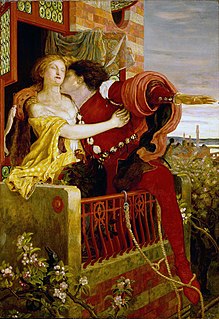
Romeo and Juliet is a tragedy written by William Shakespeare early in his career about two young Italian star-crossed lovers whose deaths ultimately reconcile their feuding families. It was among Shakespeare's most popular plays during his lifetime and, along with Hamlet, is one of his most frequently performed plays. Today, the title characters are regarded as archetypal young lovers.

Trinity College is a constituent college of the University of Cambridge. Founded in 1546 by King Henry VIII, Trinity is one of the largest of Cambridge's 31 colleges, with the largest financial endowment of any college at either Cambridge or Oxford. Trinity has some of the most distinctive architecture in Cambridge; its Great Court is said to be the largest enclosed courtyard in Europe. Academically, Trinity performs well as measured by the Tompkins Table, coming top from 2011 to 2017. Trinity was the top-performing college for the 2020-21 undergraduate exams, obtaining the highest percentage of good honours.

William Shakespeare was an English playwright, poet and actor. He is widely regarded as the greatest writer in the English language and the world's pre-eminent dramatist. He is often called England's national poet and the "Bard of Avon". His extant works, including collaborations, consist of some 39 plays, 154 sonnets, three long narrative poems, and a few other verses, some of uncertain authorship. His plays have been translated into every major living language and are performed more often than those of any other playwright. He remains arguably the most influential writer in the English language, and his works continue to be studied and reinterpreted.

World War II or the Second World War, often abbreviated as WWII or WW2, was a global war that lasted from 1939 to 1945. It involved the vast majority of the world's countries—including all of the great powers—forming two opposing military alliances: the Allies and the Axis powers. World War II was a total war that directly involved more than 100 million personnel from more than 30 countries.

Cambridge is a university city and the county town in Cambridgeshire, England. It is located on the River Cam approximately 55 miles (89 km) north of London. As of the 2021 United Kingdom census, the population of Cambridge was 145,700. Cambridge became an important trading centre during the Roman and Viking ages, and there is archaeological evidence of settlement in the area as early as the Bronze Age. The first town charters were granted in the 12th century, although modern city status was not officially conferred until 1951.

King Lear is a tragedy written by William Shakespeare. It is based on the mythological Leir of Britain. King Lear, in preparation for his old age, divides his power and land between two of his daughters. He becomes destitute and insane and a proscribed crux of political machinations. The first known performance of any version of Shakespeare's play was on St. Stephen's Day in 1606. The three extant publications from which modern editors derive their texts are the 1608 quarto (Q1) and the 1619 quarto and the 1623 First Folio. The quarto versions differ significantly from the folio version.

William, Prince of Wales, is the heir apparent to the British throne. He is the elder son of King Charles III and his first wife Diana, Princess of Wales.

Cambridge University Press is the university press of the University of Cambridge. Granted letters patent by King Henry VIII in 1534, it is the oldest university press in the world. It is also the King's Printer.
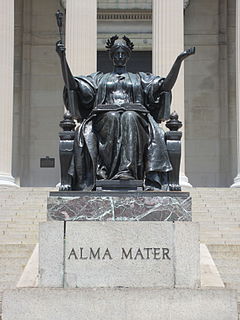
Alma mater is an allegorical Latin phrase currently used to identify a school, college or university that one formerly attended or/and graduated from.

Cambridge United Football Club is a professional association football club based in the city of Cambridge, England. They compete in EFL League One, the third tier of the English football league system. The club is based at the Abbey Stadium on Newmarket Road, approximately 2 miles (3 km) east of Cambridge city centre. The stadium has a capacity of 8,127, made up of terracing and seated areas.

Catherine, Princess of Wales, is a member of the British royal family. She is married to William, Prince of Wales, heir apparent to the British throne, making Catherine the likely next queen consort.
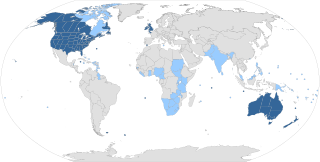
English is a West Germanic language of the Indo-European language family, with its earliest forms spoken by the inhabitants of early medieval England. It is named after the Angles, one of the ancient Germanic peoples that migrated to the island of Great Britain. English is genealogically West Germanic, closest related to the Low Saxon and Frisian languages; however, its vocabulary is also distinctively influenced by dialects of French and Latin, plus some grammar and a small amount of core vocabulary influenced by Old Norse. Speakers of English are called Anglophones.

The University of Cambridge is a public collegiate research university in Cambridge, United Kingdom. Founded in 1209 and granted a royal charter by Henry III in 1231, Cambridge is the world's third oldest surviving university and one of its most prestigious, currently ranked second best in the world and the best in Europe by QS World University Rankings. Among the university's most notable alumni are 11 Fields Medalists, seven Turing Award winners, 47 heads of state, 14 British prime ministers, 194 Olympic medal-winning athletes, and some of world history's most transformational and iconic figures across disciplines, including Francis Bacon, Lord Byron, Oliver Cromwell, Charles Darwin, Stephen Hawking, John Maynard Keynes, John Milton, Vladimir Nabokov, Jawaharlal Nehru, Isaac Newton, Bertrand Russell, Manmohan Singh, Alan Turing, Ludwig Wittgenstein, and others. Cambridge alumni and faculty have won 121 Nobel Prizes, the most of any university in the world, according to the university.





















